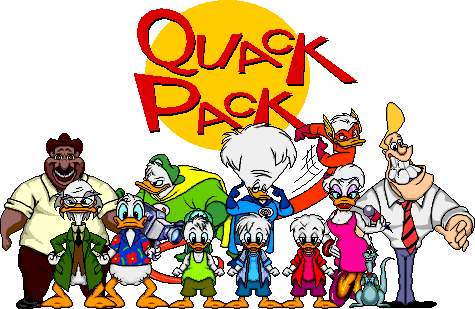Why Quack Pack Failed As A Show, Starting With Donald Duck
The most recent Ducktales episode, which featured a cameo from Darkwing Duck, piled on the nostalgia. It still met mixed reviews. I’m waiting until season two to evaluate the reboot’s flaws. In comparison to most shows, Ducktales is one of the best reboots out there. Its predecessors met very different receptions; while the original Ducktales was beloved, the 1990s Quack Pack wasn’t.
What was Quack Pack?
Quack Pack was a mid-to-late 1990s attempt to reboot Donald Duck and his nephews, sending them to the modern world. Donald’s girlfriend Daisy becomes a renowned journalist, and her episodes tend to focus on the story. The triplets, aged to teenagers, spend their time pranking their uncle, watching TV, and seeking adventure. Episodes often shifted genres from monster movies to science fiction thrillers to straight up comedies.
Quack Pack in theory should have worked. It was taking classic Disney concept and retooling it for the 1990s audience. Goof Troop did very much the same thing, by taking Goofy and planting him in 1990s suburban lifestyle, so as to update him but also retain the ridiculous slapstick that we come to adore. You also had a female character who is normally delegated to ditzy love interest, and instead she becomes a self-made woman that seeks her stories to build a career and take care of the ones that she loves.
The Reality
People hated Quack Pack. From what I have read, it was that Quack Pack on the surface was a Ducktales reboot that came too early, with the triplets’ personalities radically changed to make each of them an individual, and giving Uncle Scrooge the boot. These are fair opinions to have, and the 2017 Ducktales reboot has certainly learned from Quack Pack’s mistakes.
I didn’t hate Quack Pack. Actually, I miss it. As a kid, it was another cartoon to fill up Saturday afternoon. Donald had remained the same, and I didn’t have that much attachment to the Ducktales incarnation of the triplets because the reruns would constantly appear, and I knew there was enough space for both of them. I don’t retain this opinion for other shows now, obviously, because when reboots fail, they fail hard. (I’m looking at you, Magic Schoolbus.)
Adapting Vintage Cartoons
The big problem could be that while the triplets changed, Donald didn’t. From the vintage shorts to the Italian and English comics, Donald could alternate roles between being the tormentor or tormented victim of his nephews.He could occasionally score victory.
We didn’t get this in the animations. The triplets’ first cartoon appearance had them running Donald over with bratty behavior, and Donald making an effort to keep his cool for their sake. Subsequent appearances had them butting heads, with one or the other instigating the conflict. Donald was also their guardian after their mother Della Duck mysterious disappeared. He is their uncle, and supposedly the parental figure. Yet he doesn’t behave.
Even with the Quack Pack update, Donald was still selfish, bad-tempered, shortsighted, and not a role model. The triplets in Quack Pack often called him out for being selfish or immature, such as when he plays with their VR set while he makes dinner, or spies on them when imagining they are working against him. Donald in the meantime doesn’t see reason to change, except in one episode where he brought out the big guns to protect them. Viewers would be asking why they were staying with each other in the first place. Thus, the show couldn’t last.

Fixing Past Mistakes
The Ducktales reboot has rectified that. Far from being selfish, Donald is the epitome of selflessness. He is accomplished at adventure but refuses to seek it out because he doesn’t like people getting hurt. Often he gets hurt, but Donald is used to that. Instead, he worries about his family suffering serious injuries. We know something happened to his twin sister Della. Donald goes out seeking jobs that he hates, to support his three charges, and orders them to take maximum safety precautions. When he feels disrespected, he doesn’t take it out on the boys. While he and Scrooge dislike each other, he also respects his uncle and trusts him to keep the boys safe. The same goes with Beakley, who ends up getting along with him after they agree to make compromises about living arrangements.
As for the triplets having their personalities change, we have a reason why in the reboot: they represent the three aspects Scrooge has: curiosity, thrill-seeking, and greed. Scrooge in the reboot tempers his greed by seeking adventure and deep rather than cheap thrills, and the triplets adopt each of these aspects. Huey seeks answers from the known and has to confront the unknown, Dewey wants to prove himself, and Louie wants easy money.
Unlike in Quack Pack, where the reason seemed to take an old concept and make it new, we see thought and effort put into this trichotomy. And it works, at least for the present: Dewey is trying to find out what happened to their mother, while Louie takes things one day at a time, and Huey wants to earn prizes for learning more about the world around them.
So, as a lesson, this is how you reboot, folks: you update what needs to be updated, like relationships with family. With that said, I may catch up to Quack Pack.



